In a world where gaming has evolved from basement battles to global arenas, pro esports teams are the rock stars of the digital age. These squads don’t just play for fun; they’re in it to win it, sporting jerseys and strategies that rival traditional sports teams. With fans cheering them on from couches and stadiums alike, they’ve turned gaming into a thrilling spectator sport.
Overview of Pro Esports Teams
Pro esports teams represent a significant component of the competitive gaming landscape. These teams consist of skilled players who specialize in various titles, such as League of Legends, Dota 2, and Counter-Strike: Global Offensive. Each team typically includes five to six players, allowing for a mix of strategies and roles during matches.
Tournament participation is a vital aspect of pro esports teams. They compete in local, national, and international tournaments, often with large prize pools that can exceed millions of dollars. The International, for example, boasts one of the highest prize pools in esports history, attracting top teams worldwide.
Team organization often mirrors traditional sports franchises. Management plays a crucial role, providing support through coaching staff, analysts, and marketing teams. This structure ensures players receive the guidance necessary for peak performance.
Sponsorships contribute significantly to the financial health of pro esports teams. Major brands invest in these organizations to reach their dedicated fanbases. As esports continues to grow, these sponsorships enhance team visibility and provide essential resources for development.
Fans actively support their favorite teams through various platforms. Streaming sites like Twitch and YouTube showcase matches, while social media fosters connections between players and audiences. The culture surrounding pro esports teams evolves daily, creating an ever-expanding community of enthusiasts.
As a result, pro esports teams have transformed gaming into a global phenomenon. Competitive gaming now draws millions of viewers, rivaling traditional sports in popularity. Increased recognition continues to push esports teams to new heights, solidifying their status in the entertainment industry.
Major Pro Esports Teams

Pro esports teams play an essential role in shaping the competitive gaming environment. Notable teams such as Team Liquid, Fnatic, and TSM consistently showcase high-level gameplay and strategic prowess across various titles.
Team Liquid
Team Liquid represents a global powerhouse in esports. Founded in 2000, it boasts a rich history across multiple titles, including League of Legends and Dota 2. Their Dota 2 squad achieved significant success by winning The International 2017, securing a prize pool of over $10 million. In addition to their competitive success, Team Liquid emphasizes player development, offering support through coaching and performance analysis. Sponsorships with brands like Intel and Alienware enhance their visibility and financial stability.
Fnatic
Fnatic has firmly established itself as a leading name in the esports community. Starting in 2004, the organization has succeeded in various fields, especially in League of Legends and Counter-Strike: Global Offensive. Their CS:GO team won multiple Major Championships, displaying remarkable skill and teamwork. Fnatic prioritizes fan engagement and community involvement, hosting events and streaming content to connect with followers. Partnerships with companies like Monster Energy provide additional funding and resources, bolstering their competitive edge.
TSM
TSM, known for its impact in the esports landscape, was founded in 2009. The organization quickly rose to prominence through its League of Legends team, winning the North American Championship Series multiple times. Furthermore, TSM has expanded its presence into VALORANT, consistently competing at high levels. The team promotes a strong brand identity, creating a dedicated fan base through content creation and merchandise. Collaborations with sponsors like Logitech and Corsair contribute to their growth and stability in the esports arena.
The Role of Pro Esports Teams
Pro esports teams play a vital role in the competitive gaming environment, driving player expertise and engaging with fans worldwide.
Player Development
Player development forms the foundation of success for pro esports teams. Teams invest in coaching staff who provide strategic guidance, feedback, and constructive criticism. This mentorship nurtures individual talents and strengthens teamwork. Statistical analysis tools monitor player performance during practice and competitions. By reviewing game footage, teams pinpoint areas for improvement and refine strategies. Regular training sessions focus on skill enhancement, game mechanics, and in-game communication. Some teams host boot camps before major tournaments, fostering camaraderie and minimizing performance anxiety. Such a structured approach promotes sustained growth and allows players to reach their potential at the highest levels of competition.
Community Engagement
Community engagement reflects the commitment of pro esports teams to their fans. Teams often organize events that enable fans to interact with players through meet-and-greets, Q&A sessions, and fan tournaments. Social media platforms serve as crucial tools for communication, where teams share content, updates, and highlight reels. Merchandise sales, including jerseys and branded gear, deepen fans’ connection to teams. Many teams maintain local presence by participating in charity events and community outreach, cultivating a positive image. Live streaming on platforms like Twitch creates opportunities for real-time interaction, enhancing viewers’ experience. These efforts solidify bonds between teams and their supporters, making them integral to the esports ecosystem.
Challenges Faced by Pro Esports Teams
Pro esports teams encounter several challenges that can impact their performance and longevity in the competitive scene.
Financial Instability
Financial instability remains a significant concern for many pro esports teams. Revenue from tournaments can fluctuate greatly, making it difficult to maintain consistent funding. Sponsorship deals often depend on the team’s performance and popularity, leading to unpredictable income streams. Teams face competition for sponsorships from many brands, resulting in intense negotiations and fluctuating financial support. Additionally, many teams invest heavily in player development and marketing, further straining budgets. This uncertainty can hinder a team’s ability to secure top talent or create stable operations, posing risks to their long-term success.
Player Health and Well-Being
Player health and well-being are vital yet challenging aspects of esports. The demanding practice schedules can lead to burnout, with players often spending long hours on training and competition. Physical health can deteriorate due to extended periods of sitting and minimal exercise, resulting in issues like repetitive strain injuries. Mental health is equally important, as the pressure to perform can create stress and anxiety. Many organizations recognize these challenges and now provide resources, such as mental health support and fitness programs, to prioritize players’ well-being. Ensuring overall health can significantly enhance performance and keep players engaged in their careers.
Conclusion
Pro esports teams have firmly established themselves as a driving force in the gaming industry. Their influence extends beyond competition to shape community engagement and fan interaction. As these teams continue to evolve and adapt to the dynamic landscape of esports, they face challenges that require innovative solutions.
The commitment to player development and mental well-being is essential for maintaining a competitive edge. With the support of sponsors and a dedicated fanbase, pro esports teams are poised to thrive in the entertainment sector. Their journey reflects a remarkable transformation of gaming into a respected and celebrated sport.

